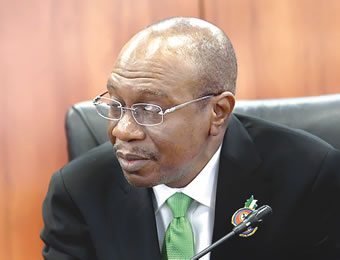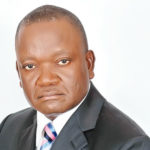Governor of the Central Bank of Nigeria (CBN) Mr. Godwin Emefiele on Tuesday described some recipe prescribed for the revitalisation of the economy by Presidential candidate of Peoples Democratic Party (PDP) Alhaji Atiku Abubakar as an invitation to disaster and a sure way to perdition.
Emefiele who was answering questions after the meeting of Monetary Policy Committee (MPC) meeting at the bank headquarters in Abuja said the committee reviewed Atiku’s recommendation of free-floating the currency “and concluded that it would be the wrong step to take.
“It is as good as saying that we should go back to the era of Structural Adjustment Programme (SAP) in Nigeria. The implication can better be imagined.
“It will certainly lead to capital flight, lead to massive depreciation or devaluation of the currency and ultimately to currency crisis in Nigeria and I think we should all know that it is a road to perdition to ever go in that direction.”
Atiku had last week Wednesday during an interview with Bloomberg said he would appoint a new central bank governor and float the naira if he wins next month’s elections.
Godwin Emefiele is not doing a good job, Abubakar said, adding that he’d make the change when the governor’s first term ends in June.
“I don’t think he’s pursued the right policies,” Abubakar, 72, said Wednesday in an interview in Nigeria’s commercial capital, Lagos. “We have to have the right people in there.”
“Under Emefiele, who was appointed in 2014, Nigeria has tightened capital controls and closely controlled the naira’s value.
“The governor has consistently said this is the best way to curb inflation and revive manufacturing by discouraging imports.
“The country now has a system of multiple exchange rates, which several foreign investors have criticised.”
ALSO READ: We have evidence Bauchi govt arming thugs with assault rifles ―Dogara
But Emefiele declared “first, there is no capital control in Nigeria today because you cannot find the CBN trying to intervene in the market for demand and supply of foreign exchange.
“Normally, Central Bank as an independent institution is apolitical but it is also important to state that at the MPC meeting today we asked ourselves if there is any merit in it to begin to say that we should look at free-floating the currency or that we should allow free import of goods that we have restricted?
“MPC came to a conclusion that this was a wrong premise. We cannot be talking about allowing import of items that can be produced in the country today exporting jobs from Nigeria to foreign countries?
“And we say we have the interest of Nigeria at heart? We don’t agree with anybody.
“It is a wrong premise to say that you will allow imports to just flood the country just because you want to please anybody. It is not in our interest. And we reiterate that we are apolitical.
“We will remain apolitical. We will not want anybody to drag the central bank into issues that is within our remit otherwise, we would respond to it.”
On the list of 42 items prohibited from using officially sourced foreign exchange to import, the CBN Governor said CBN will get even more aggressive to see to it that any or all food items that can be produced in Nigeria and consumed in Nigeria and are currently being imported into Nigeria will be included on the FX restriction list.
“If you have free dollars, you can bring it in but you will not be able to even make payments for those goods with dollars from the Nigerian foreign exchange market.
“This is because we think that the initiatives that CBN has put in place in the past to cut imports and diversify the structure of the Nigerian economy is yielding results and we will continue to be that aggressive.
“And we also went further to say that the Economic Intelligence Department of the CBN together with EFCC would investigate any company, any individual suspected of bringing these items through smuggling or any means for money laundering and economic sabotage.
“And that if we discover and conclusively that these companies or individuals that are involved in bringing these goods, we would write to all the banks that they should blacklist all those companies and individuals running those companies that they can no longer operate any bank accounts in any Nigerian bank.
“We don’t need to talk about prosecuting them but just to say we will not allow you to do business in Nigeria and of course you know the implications of that,” he explained.






